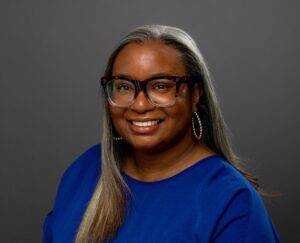Plenary Sessions
Teaching Professor
Online Conference: Ready, Set, Teach
Live Online: July 22–24, 2025
On-Demand Access: July 25–October 27, 2025
Get Inspired by Visionary Educators
Our plenary sessions will feature dynamic thought leaders in higher education sharing actionable insights and powerful ideas to transform your teaching. These keynote presentations will leave you energized and equipped with strategies you can implement right away. Stay tuned as we reveal our inspiring speakers and their thought-provoking topics—this is the heart of the conference you won’t want to miss!
Tuesday, July 22, 2025 | 10:00–11:15 AM Central
Evidence-Based Ways to Engage Students and Revitalize Teaching in a Collaborative World
Presented by Christina Katopodis, PhD, Mellon Senior Researcher, City University of New York's Humanities Alliance
How do we make the transition from the hierarchical, inequitable, output-driven academy we inherited from the nineteenth century to a higher education that empowers all students to be their own best selves, modeling a more democratic, flourishing, and just society? How do we make this transition in our own classrooms and keep students engaged throughout the semester without getting burned out in the process? In this interactive keynote, Dr. Christina Katopodis, coauthor with Cathy N. Davidson of the award-winning book, The New College Classroom (Harvard University Press, 2022), shares teaching strategies that anyone can adapt easily and effectively in every field and grab-and-go activities that educators around the world are using successfully every day to ensure their students’ lifelong success–and to revitalize their own commitment to a better world.
 Christina Katopodis, PhD, is a Mellon Senior Researcher at the City University of New York’s Humanities Alliance. She is the former Associate Director of Transformative Learning in the Humanities and founder of Engaged & Ready, a project that empowers faculty with active learning tools to democratize their classrooms. She is the winner of the 2019 Diana Colbert Innovative Teaching Prize and the 2018 Dewey Digital Teaching Award. She has authored or co-authored articles published in Chronicle of Higher Ed, English Language Notes, ESQ, Hybrid Pedagogy, Inside Higher Ed, ISLE, MLA’s Profession, Times Higher Ed, and Zeal: A Journal for the Liberal Arts. With Cathy N. Davidson, Katopodis is author of The New College Classroom (Harvard University Press, 2022), winner of AAC&U’s 2023 Frederic W. Ness Book Award.
Christina Katopodis, PhD, is a Mellon Senior Researcher at the City University of New York’s Humanities Alliance. She is the former Associate Director of Transformative Learning in the Humanities and founder of Engaged & Ready, a project that empowers faculty with active learning tools to democratize their classrooms. She is the winner of the 2019 Diana Colbert Innovative Teaching Prize and the 2018 Dewey Digital Teaching Award. She has authored or co-authored articles published in Chronicle of Higher Ed, English Language Notes, ESQ, Hybrid Pedagogy, Inside Higher Ed, ISLE, MLA’s Profession, Times Higher Ed, and Zeal: A Journal for the Liberal Arts. With Cathy N. Davidson, Katopodis is author of The New College Classroom (Harvard University Press, 2022), winner of AAC&U’s 2023 Frederic W. Ness Book Award.
Wednesday, July 23, 2025 | 10:00–11:15 AM Central
AI We Ready? Determining Your AI Strategy for the Next Academic Year
Presented by Lance Eaton, PhD, Senior Associate Director of AI in Teaching and Learning, Northeastern University
As we enter the third academic year of the age of Generative AI, how can we best prepare to thoughtfully engage with these ever-ubiquitous and ever-changing tools? This plenary session will have something for everyone. We’ll dive into how to navigate your relationship with Generative AI in the upcoming semester, explore the latest developments in AI tools, highlight real-world use cases, and tackle key challenges AI presents for higher education—all with a focus on thoughtful and strategic engagement.

Dr. Lance Eaton is the Senior Associate Director of AI in Teaching and Learning at Northeastern University. His work engages with the possibility of digital tools for expanding teaching and learning communities while considering the various deep issues and questions that educational technologies open up for students, faculty, and higher ed as a whole. He has given talks, written about, and presented at conferences on artificial intelligence generative tools in education, academic piracy, open access, OER, open pedagogy, hybrid flexible learning, and digital service-learning. His musings, reflections, and ramblings on AI and Education can be found on his blog: https://aiedusimplified.substack.com/
Thursday, July 24, 2025 | 2:00–3:00 PM Central
Higher (Un)Learning: Engaging Graduate Students in Collaborative Grading
Presented by Laila McCloud, PhD, Assistant Professor of Higher Education, Grand Valley State University
Grades are tools that faculty use to communicate the quality of student understanding and growth. Students, faculty, and staff also use this tool to measure the effectiveness of teaching methods and assessments. In recent years, there has been a growing conversation among faculty, especially those who teach graduate students, questioning the utility of traditional grading methods. We’ve noticed how traditional grading practices perpetuate a unidirectional relationship between the instructor and student. These methods and practices also limit graduate students’ ability to develop assessment skills which are critical for contemporary practice. Collaborative grading disrupts the unidirectional relationship between faculty and students and also enhances assessment skills. This session will discuss opportunities to use a collaborative grading in graduate classrooms. Attendees will also gain an understanding of how to address the assessment learning needs of students entering graduate education immediately after completing an undergraduate degree.

Dr. Laila McCloud (she/her), is an Assistant Professor of Higher Education at Grand Valley State University, where she brings both passion and purpose to the classroom. Informed by a PhD in higher education and student affairs from the University of Iowa, she’s a proud Hawkeye who has turned her scholarly curiosity into transformative tools to advance equity in higher education. Before entering the professoriate, McCloud was a student affairs educator. Now, her practice dives into critical questions like how Black students navigate college, the evolving role of multicultural student affairs, and what makes teaching in graduate programs truly impactful. When she’s not grading papers or sitting in meetings about meetings, McCloud enjoys cheering loudly at sporting events and spending time outside with her dog, Mamba.
